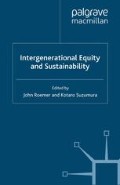Abstract
During the next thirty to fifty years, the populous, poor countries of China and India will, one hopes, approach the current per capita income of countries in the highly developed world today. In purchasing-power-parity terms, China’s per capita in 2003 was $4,990, while Britain’s was $27,650.1 At an annual rate of real growth of 7% per annum — considerably less than China’s growth rate over the past twenty years — China’s per capita income will overtake Britain’s current income in twenty-five years’ time. One can expect that Chinese and Indian citizens will desire at least the standard of living that Britons enjoyed in 2003. The pressure on the natural resource base of the earth, in particular the biosphere, will in all likelihood be immense.
We are indebted to Marc Fleurbaey, Toshihiro Ihori, Marco Mariotti, Ngo Van Long, and participants in seminars at the Catholic University of Milan, Queen Mary, the State University of Milan, and to the IEA conference on intergenerational equity, for comments and suggestions. The usual disclaimer applies.
Access this chapter
Tax calculation will be finalised at checkout
Purchases are for personal use only
Preview
Unable to display preview. Download preview PDF.
References
Arrow, K. (1973) ‘Rawls’s Principle of Just Saving’, Swedish Journal of Economics, vol. 75, pp. 323–35.
Dasgupta, P.S. (1974) ‘On Some Alternative Criteria for Justice between Generations’, Journal of Public Economics, vol. 3, pp. 405–23.
Nagel, T. (delivered 2004 ) ‘The Problem of Global Justice’, Storrs Lectures, Yale University Law School.
Pogge, T.W. (2002) World Poverty and Human Rights: Cosmopolitan Responsibilities and Reforms ( Cambridge UK: Polity Press).
Rawls, J. (1999) The Law of Peoples ( Cambridge, MA: Harvard University Press )
Silvestre, J. (2002) ‘Progress and Conservation under Rawls’s Maximin Principle’, Social Choice and Welfare, vol. 19, pp. 1–27.
World Bank (2004) World Development Indicators Database.
Editor information
Editors and Affiliations
Copyright information
© 2007 International Economic Association
About this chapter
Cite this chapter
Roemer, J.E., Veneziani, R. (2007). Intergenerational Justice, International Relations and Sustainability. In: Roemer, J., Suzumura, K. (eds) Intergenerational Equity and Sustainability. International Economic Association Series. Palgrave Macmillan, London. https://doi.org/10.1057/9780230236769_13
Download citation
DOI: https://doi.org/10.1057/9780230236769_13
Publisher Name: Palgrave Macmillan, London
Print ISBN: 978-1-349-28344-6
Online ISBN: 978-0-230-23676-9
eBook Packages: Palgrave Economics & Finance CollectionEconomics and Finance (R0)

